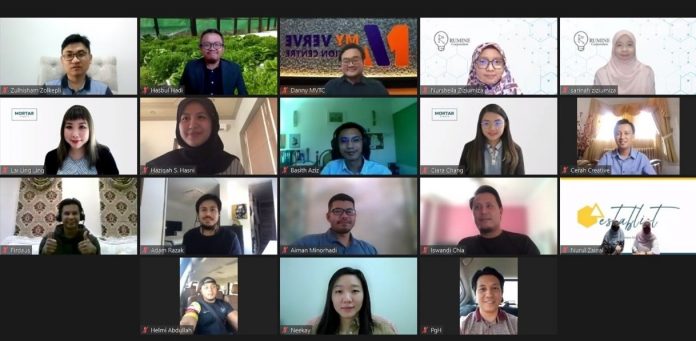With six figures in annual revenue and a growing client base of national agencies and corporates, Augmented reality (AR) and Virtual Reality (VR) developer Rumine was named the top startup of the seventh edition of Darussalam Enterprise’s (DARe) flagship startup programme Accelerate.
Belait-based automated car wash Xpress Enterprise took second with their pitch to open outlets nationwide, while the secondhand-focused fashion marketplace Thryffy was named third with their mobile application gaining over 4,000 users in less than six months.
The 100-day Accelerate programme was held fully virtually due to the ongoing second wave of COVID-19 in the country, culminating in a pitching session – also known as a demo day – were startups presented to a panel of judges.
14 startups participated in the pitch on November 20, which was streamed live. The top three will have the opportunity to pitch and connect with regional investors and venture builders, facilitated by the appointed trainer of the latest Accelerate cycle, Golden Equator Consulting – whose main base is in Singapore.
Judging the demo day were Golden Equator Ventures Investment Portfolio Manager Jean Yeow; Shazali & Partners founder Shazali Sulaiman and Mindtrex Academy founder Pg Khairi Pg Metussin.
Rumine projects over 240k for 2021 revenue
Having swept local tech and entrepreneurship awards, Rumine is poised for their best financial year yet with $243,500 in projected annual revenue in 2021, driven mostly by developing extended reality (xR) training and educational content for established players in the public and private sector.
Co-founder and CEO of Rumine Sarinah Ziziumiza said clients engage them to develop xR experiences utilising AR, VR – or sometimes a mix of both – to effectively substitute or prepare people for offline scenarios.
Brunei’s Safety, Health and Environment National Authority (SHENA) engaged Rumine to develop a safety VR simulation that has been used by over 300 people. In the same sector, Rumine is also building a virtual first aid training course for MAED Trainings and Consultancy.
Other applications include a virtual techwork learning protal for the Institute of Brunei Technical Education and AR leaning books which incorporate gamification for the Ministry of Education.
“We are able to create XR platforms for clients based on their content and target audience,” said Sarinah. “We have custom development as well as software as a service (SaaS – more affordable subscription option) for businesses. For consumers, we also have a marketplace where people can pick from courses to learn from the comfort of their own home.”
Cuci Xpress to open in Brunei-Muara next month
Cuci Xpress started in Belait earlier in March with a pitch to clean your car for $8 in eight minutes. Combining an automatic car wash machine and some manual finishing touches, Cuci Express has since cleaned 5500 cars and is now planning to open in Brunei-Muara next month.
The brainchild of four friends: three seasoned professionals in the oil and gas industry and the other, a sales executive for a telco – Cuci Xpress is a service under Xpress Enterprise, which hopes to convert popular conventional services into shorter, more convenient options by importing readily available global technology.
“In the future we want to apply the express concept to other areas; for construction, fuel, groceries and F&B,” said co-founder Firdaus Basheer. “For now we are focusing on car cleaning. By (Q4) 2022 we hope to run six shops.”
Ohio graduates cast net into secondhand market
Adam Razak and Azril Jamaluddin met while studying at Ohio University; Adam went on to serve as director for Brunei-based private equity firm Fleet Rofhas, while Azril returned to Malaysia where he continued growing his secondhand clothing business Family Bundle into a chain of 15 stores across three states.
Secondhand wear has recently enjoyed a surge in popularity driven not just by bargain hunters, but a growing number of consumers who are more mindful of the ecological impact of apparel production and the value of reusables.
Online peer-to-peer marketplaces, where people list and send items to buyers, are driving secondhand fashion popularity, especially amongst more branded items – and Adam and Azril hope to carve out their own slice with Thryffy.
The duo estimates the secondhand segment to be currently 6% of the overall apparel market in Brunei and Malaysia, corresponding to US$5.2 million and US$528 million respectively.
Thryffy launched as a mobile application for the Malaysian market earlier in July, and has since draw 4,000 users, with 3,500 items listed and 150 transactions recorded. The duo are now planning for their Brunei launch in February 2022.
The platform charges sellers a flat US$0.50 transaction fee, plus a commission of US$0.20 for items below US$5, and 11% to 15% of sale price for items above US$5.
Adam believes Thryffy’s strength over other platforms will be their singular focus on fashion and improved classification and verification process when uploading items.
“Statistics show that online apparel sales account for only 19% of total sales in Malaysia and 11% for Brunei. This means the majority of quality and branded secondhand clothing is not in thrift stores but in consumers’ closets,” said Adam.
DARe inviting more entrepreneurs to apply for business bootcamps
Accelerate is open to early stage businesses with ambitions of scaling nationwide and abroad by leveraging on technology, innovative business models and raising investment. Over 150 startups have joined Accelerate since 2017, collectively raising more than $2 million in investment and creating more than 500 jobs.
To participate in Accelerate, applicants need to first participate in an ideation workshop, where they will flesh out the initial viability of their existing or proposed concept using the business lean canvas methodology.
Accelerate is one of two cohort-based business bootcamps offered by DARe – the other being the Micro bootcamp; which targets growing smaller, self-employing businesses that can sustainably operate through more traditional, but nevertheless profitable avenues.
Registration for DARe bootcamps can be done through their website. Both bootcamps operate up to three cycles annually, while the ideation workshop is held on a monthly basis.












